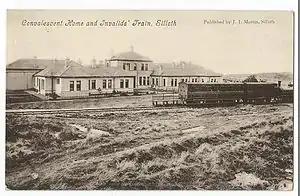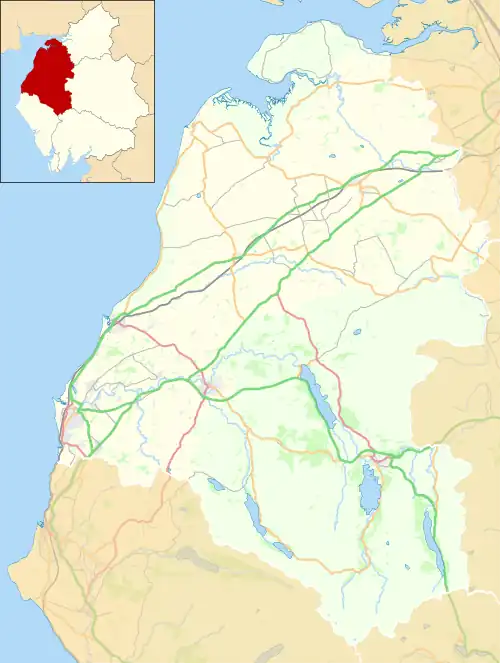Cumberland and Westmorland Convalescent Institution | |
|---|---|
 The station with a typical train, around the beginning of the 20th century | |
| General information | |
| Location | Silloth, Cumberland England |
| Coordinates | 54°51′54″N 3°23′48″W / 54.8651°N 3.3967°W |
| Grid reference | NY104531 |
| Platforms | 1[1][2] |
| Other information | |
| Status | Disused |
| History | |
| Original company | Carlisle & Silloth Bay Railway & Dock Company |
| Pre-grouping | North British Railway |
| Post-grouping | London and North Eastern Railway |
| Key dates | |
| 1862 | Opened |
| Unclear,[3] either about 1928[4] or after 1937[5] | Closed |
| Location | |
Carlisle and Silloth Bay Railway | ||||||||||||||
|---|---|---|---|---|---|---|---|---|---|---|---|---|---|---|
| ||||||||||||||
Cumberland and Westmorland Convalescent Institution railway station was a terminus off the short Blitterlees Branch off the Carlisle and Silloth Bay Railway, within Silloth itself.[6] The larger railway ran from Carlisle, England. The station does not appear on standard railway maps,[7] but it can be discerned with a magnifying glass on at least two published maps[8] and clearest of all on the 1914 25" OS map.[9]
The station's sole purpose was to serve the convalescent home of the same name. Although this was the home's formal title, it was widely referred to as "Silloth Convalescent Home", as was the station. The station never appeared in public timetables.[10]
"Invalid Trains" to the station were run on an ad hoc basis, though for many years they commonly ran on Thursdays around 15:00, preceded by a shunter or a guard on foot, as the line to the station was a siding without signals or fencing.[5][11]
The unstaffed station was minimalist, consisting of a single wooden platform next to the single track.
The home and station opened in 1862. One source states that the station is believed to have closed around 1928, whilst another, with local knowledge, refers to it as both mentioned in the 1937 Sectional Appendix and "open during the Second World War".[5] In 2015 the home was still operating.[12]
See also
References
- ↑ The station, via Cumbrian Railways Association
- ↑ Biddle 1981, p. 66.
- ↑ Croughton, Kidner & Young 1982, p. 126.
- ↑ Quick 2009, p. 353.
- 1 2 3 Thomlinson 1985, p. 74.
- ↑ Suggitt 2008, p. 103.
- ↑ Jowett 1989, Map 36.
- ↑ Puxley 2009, pp. 32 & 44.
- ↑ The station on a 1914 OS map, via National Library of Scotland
- ↑ Robinson 2002, p. 41.
- ↑ Liddell 1984, p. 114.
- ↑ The convalescent home, via Its own website
Sources
- Biddle, Gordon (1981). Railway Stations in the North West. Clapham, North Yorkshire: Dalesman Books. ISBN 978-0-85206-644-7.
- Croughton, Godfrey; Kidner, R. W.; Young, Alan (1982). Private and Untimetabled Railway Stations, Halts and Stopping Places. The Oakwood Press. ISBN 978-0-85361-281-0. OCLC 10507501.
- Jowett, Alan (March 1989). Jowett's Railway Atlas of Great Britain and Ireland: From Pre-Grouping to the Present Day (1st ed.). Sparkford: Patrick Stephens Ltd. ISBN 978-1-85260-086-0. OCLC 22311137.
- Liddell, H. M. (March 1984). Slater, John (ed.). "Shot at Silloth". The Railway Magazine. London: Tothill Press Limited. 130 (995). ISSN 0033-8923.
- Puxley, Chris (2009). The Port of Silloth 1858 - 2009: A Pictorial History Through 150 Years of a Solway Port. Portishead: Bernard McCall. ISBN 978-1-902953-42-7.
- Quick, Michael (2009) [2001]. Railway passenger stations in Great Britain: a chronology (4th ed.). Oxford: Railway & Canal Historical Society. ISBN 978-0-901461-57-5. OCLC 612226077.
- Robinson, Peter W. (2002). Cumbria's Lost Railways. Catrine: Stenlake Publishing. ISBN 978-1-84033-205-6.
- Suggitt, Gordon (2008). Lost Railways of Cumbria (Railway Series). Newbury: Countryside Books. ISBN 978-1-84674-107-4.
- Thomlinson, G. (February 1985). Peascod, Michael (ed.). "Rails on the Solway - 2". Cumbrian Railways. Pinner: Cumbrian Railways Association. 3 (5). ISSN 1466-6812.
Further reading
- Bradshaw, George (1985) [July 1922]. Bradshaw's General Railway and Steam Navigation guide for Great Britain and Ireland: A reprint of the July 1922 issue. Newton Abbot: David & Charles. ISBN 978-0-7153-8708-5. OCLC 12500436.
- Edgar, Stuart; Sinton, John H. (1990). The Solway Junction Railway. Catrine: The Oakwood Press. ISBN 978-0-85361-395-4. LP176.
- Marsh, John; Garbutt, John (1999). Cumbrian Railways. Stroud: Alan Sutton Publishing Ltd. ISBN 978-0-7509-2043-8.
- Mullay, Alexander J. (2006). Rails Across the Border. Stroud: Tempus Publishing. ISBN 978-0-7524-3666-1.
- Robinson, Peter W. (August 1995). Peascod, Michael (ed.). "Maryport & Carlisle 150". Cumbrian Railways. Pinner: Cumbrian Railways Association. 5 (12). ISSN 1466-6812.
- Robinson, Peter W. (1985). Railways of Cumbria. Clapham, North Yorkshire: Dalesman Books. ISBN 978-0-85206-815-1.
- Voice, David (2007). Hospital Tramways and Railways (3rd ed.). Brora: Adam Gordon. ISBN 978-1-874422-67-9.
- Webb, David R. (September 1964). Cooke, B.W.C. (ed.). "Between the Solway and Sellafield: Part One". The Railway Magazine. Vol. 110, no. 761. London: Tothill Press Limited. ISSN 0033-8923.
- White, Stephen (1984). Solway Steam: The Story of the Silloth and Port Carlisle Railways, 1854-1964. Carlisle: Carel Press Limited. ISBN 978-0-9509096-1-5.
External links
- The station on a navigable Edwardian OS map National Library of Scotland]
- The station on the branch, with mileages Railway Codes
- The line with period photographs Holme St Cuthbert History Group
- The line and station Cumbrian Railways Association
- The station Rail Map Online
- The station and institution from the air Britain from the Air (free login needed to zoom)
- The home and station Rail UK
| Preceding station | Disused railways | Following station | ||
|---|---|---|---|---|
| Black Dyke Halt Line and station closed |
North British Railway Carlisle and Silloth Bay Railway |
Terminus |

